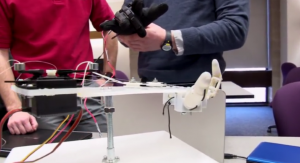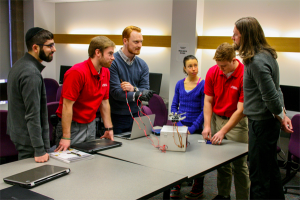University of Hartford Students Develop First-of-Its Kind Prosthetic Hand, Patient Testing To Begin
/Five graduate students and their professor in the Prosthetics and Orthotics program at the University of Hartford have reached a significant milestone in the development of a first-of-its-kind prosthetic hand. The prototype of the potentially revolutionary device, after more than two years in development, is now ready to be tested on patients. Currently, amputees have a limited selection of sizes and designs for a prosthetic hand. The groundbreaking project, which has come to be known as the “Hartford Hand,” has a unique design that allows each patient to receive a custom-made hand that fits his or her exact needs. Because of the students’ technological ingenuity, the hand can be adjusted as the patient grows.
“It is the only hand at this time known to be completely customizable in terms of size and proportion,” said faculty advisor Michael Wininger, Assistant Professor of Prosthetics and Orthotics. (see video, below)
The five graduate students, due to graduate from the program in May, have spent thousands of hours on this project since 2013, with the goal of making the world’s first prosthetic hand that can be fully customized to patients’ needs. The students have joined the project through many pathways, either as part of their formal requirements for research in their master’s curriculum, though undergraduate honors theses, elective Independent study enterprise, or as extra-curricular collaborators in a not-for-credit research immersion.
“This has been one the best opportunities I have had in my life to design,” said Christopher Welch, one of the stud ents currently working on the Hartford Hand initiative. Each week, Welch and colleagues Yonathan Moshayev, Jake Green, Amber Sayer, and Stephen Sousa, spend several hours improving the current design to make the unique Hartford Hand a reality for patients.
ents currently working on the Hartford Hand initiative. Each week, Welch and colleagues Yonathan Moshayev, Jake Green, Amber Sayer, and Stephen Sousa, spend several hours improving the current design to make the unique Hartford Hand a reality for patients.
The University of Hartford’s College of Education, Nursing and Health Professions collaborates with Hanger Clinic to offer the Master of Science in Prosthetics and Orthotics (MSPO). It is one of only 13 accredited programs in the United States. The curriculum provides students with strong foundational coursework in biomechanics, neuroscience, and kinesiology.
More than a great learning experience, the project has the potential to change lives as it prepares students for future career success. “They have more training than any other students in the country,” Wininger said, “which makes them competitive for their residencies. This is a good chance for students to train on cutting-edge technology.”
Two of the students presented the Hartford Hand at a national conference in San Antonio, Texas last year. “We were able to get professional feedback and network with people in our field,” said Sousa. Welch adds that everyone they talked with confirmed that there is a huge need for this hand. Both of them are planning to use the skills they have learned with this project to work in clinics after they graduate. “I am very grateful to have had this opportunity,” Sousa said. “I could not imagine a program without this great experience.” Previous students have presented at national conferences in Las Vegas, and have entered the Hartford Hand design into national engineering design competitions.
Wininger indicated that he anticipated tests with human subjects would begin by the end of the University’s spring semester.
The professions of prosthetics and orthotics are specialized allied health professions which combine a unique blend of clinical and technical skills. Professionals in this field design, fabricate, and fit orthopedic braces and artificial limbs for a broad range of clients from pediatric to geriatric.
PHOTO (at right): Yonatan Moshayev, Jake Green, Christopher Welch, Amber Sayer, Steve Sousa, and Assistant Professor Michael Wininger.
https://youtu.be/uxyeoi3G9ks






























